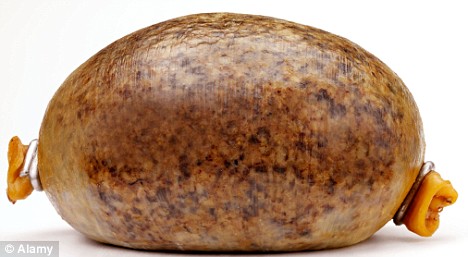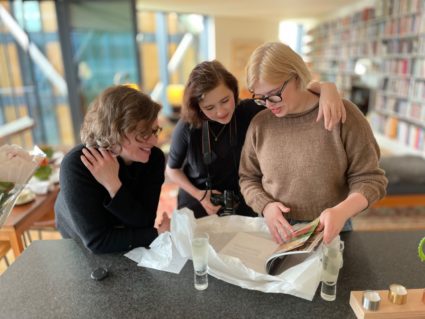Burns Night revels

Well, until it happened to me, I wouldn’t have believed that something looking like this could land on a dinner table ANYWHERE near me. I’ve lifted this photo from the Daily Mail, which in the person of Tom Parker Bowles was trying to convince people to celebrate Burns Night even though a creature like this might turn up unannounced and demand to be eaten. Yes, it’s haggis. I have heard many, many accounts of this storied Scottish dish, but until Sunday night it had never passed my lips. And before I say anymore, it was DELICIOUS.
Burns Night is a traditional evening meant to celebrate the life and work (and appetite, apparently) of Robert Burns, the renowned Scottish poet who was born 250 years ago on Sunday, January 25th. The revels include the reading of a poem devoted to haggis (luckily there was a Scottish man on hand to perform this), the ritual presentation of the haggis, and then in what must be a stunningly painful climax for the poor piece of lamb-stuffed intestine, the ceremonial stabbing and rending from end to end of the haggis. Ouch.
We were lucky enough to be invited to Avery’s chum Emily’s warm and friendly house just a few streets away, for the big event. Emily’s mum Annie is fast becoming one of my nearest and dearest. The whole family are full of energy, fast-paced and generous to a fault: young Fred had come by the previous day with a bevy of chocolate fondants for us, and my goodness that fellow can cook. He and I have many impassioned discussions about food, the absolute supremacy of cooking as part of daily life and the utter unfairness of the timed cooking round on “Masterchef.” “No one cooks under pressure in real life at home! It’s ridiculous!” he explodes. I so agree. So Sunday night found us walking to their house with the clean fondant ramekins, the plate on which Annie brought brownies for the Inauguration, a bottle of Polish vodka… you name it. Of course as we approached, John smote himself on the forehead: “Why the hell are we bringing VODKA to a Scottish man’s birthday party?”
Lovely, lovely evening. Other friends were already there, toting a very alert and well-behaved four-month-old baby girl that Emily immediately took charge of. Cooing, bouncing her up and down, Emily tried to convince my child, the least maternal creature on earth, of the charms of babyhood. Avery, while not actually getting up and leaving the room, contrived to get as far away from the baby as she could. I must remember to tell my sister and brother-in-law how divine Avery must think THEIR new baby is, to have treated her so nicely at Christmas. Never mind, early motherhood isn’t for everyone.
We repaired to the dining room, one of my favorite spots on earth now, glowing dark red walls, gorgeous art collection, Annie’s special hand-lettered place cards, everyone’s smiling faces. There was a gorgeous salad of lamb’s lettuce, smoked salmon (Scottish!) and quail’s eggs, hard-cooked. My first quail’s egg not in a restaurant, and I couldn’t help thinking of dear Sebastian Flyte in “Brideshead Revisited,” for whom they were one of the four basic food groups along with whiskey, champagne and gin.
Then our Scottish guest intoned the poem, with a MUCH more pronounced Scottish burr than I noticed in ordinary conversation!
Address To a Haggis
Fair fa’ your honest, sonsie face,
Great chieftain o’ the puddin-race!
Aboon them a’ ye tak your place,
Painch, tripe, or thairm:
Weel are ye wordy o’ a grace
As lang’s my arm.
The groaning trencher there ye fill,
Your hurdies like a distant hill,
Your pin wad help to mend a mill
In time o’ need,
While thro’ your pores the dews distil
Like amber bead.
His knife see rustic Labour dicht,
An’ cut you up wi’ ready slicht,
Trenching your gushing entrails bricht,
Like ony ditch;
And then, O what a glorious sicht,
Warm-reekin, rich!
******************
Here Christopher plunged the knife into the haggis and I got my first surprise: it doesn’t slice, as you expect it to, like a sausage: it… implodes. Well, it deflates and oozes. None of which make it sound very appealing, I’m aware of that, but the odor is delectable, and the texture most surprising. It’s merely ground lamb and oatmeal, for the most part, and quite, quite lovely. The sheep’s intestine serves merely as casing, and when Avery said later, “I’ll never eat haggis because I’ll never eat intestine,” I mentally crossed my fingers and hissed inaudibly, “John, don’t you say a word about sausages…” but no such luck. “Well, you know, ordinary bangers are cased in intestine, too.” This was said with great relish by my husband, whose job it is NOT to find something we will all three eat at dinner, among which things was, until that moment, a sausage. For heaven’s sake.
With our haggis came the traditional neeps and tatties: with a nice flair for presentation, Annie added carrots to the turnips, the “neeps,” and the mash was fluffy and quite a perfect foil for the rich, luxurious haggis. Divine! The dessert was traditional as well, and very nice for people like me who don’t like heavy, sweet puddings. Here it is, from Xanthe Clay’s column in the Daily Telegraph:
Cranachan
(serves 6)
4oz/110g rolled oats or pinhead oatmeal
10floz/280ml double cream
11oz/300g crowdie or Quark
6 tbsp heather honey
5 tbsp whisky
1 bag frozen raspberries, defrosted
Put the oats in a large frying pan and cook over a medium high heat, stirring constantly, for 5–8 minutes until they turn brown and smell toasty.
Tip on to a plate to cool.
Lightly whip the double cream and mix with the cheese, which will make the cream stiffen up more.
Roughly stir in 4 tbsp honey and all the whisky.
Layer the cream, oats and raspberries in six glasses, finishing with a dribble of honey and a few raspberries.
Eat immediately or keep in the fridge.
*******************
A delight. We of course stayed far too late, on a school night, but it was worth it. This sort of evening makes me feel even more than usually grateful for good friends: and British friends! When we lived here in the early 1990s, I am ashamed at how few British friends we made. Part of that lack was to do with how many expatriate friends we had, but part of it was the lack of a school-age child to pull us into relationships (and the attendant adventures) with real people who are part of real British life. I know I will never be an Old Girl from Avery’s school, as Annie is, nor am I married to an Oxbridge gentleman as her husband is, but we can bask in their reflected glory, whenever we’re lucky enough to be invited. A rare night.

